Charles E W Bean, Diaries, AWM38 3DRL 606/277/1 - 1926-1939 - Part 2
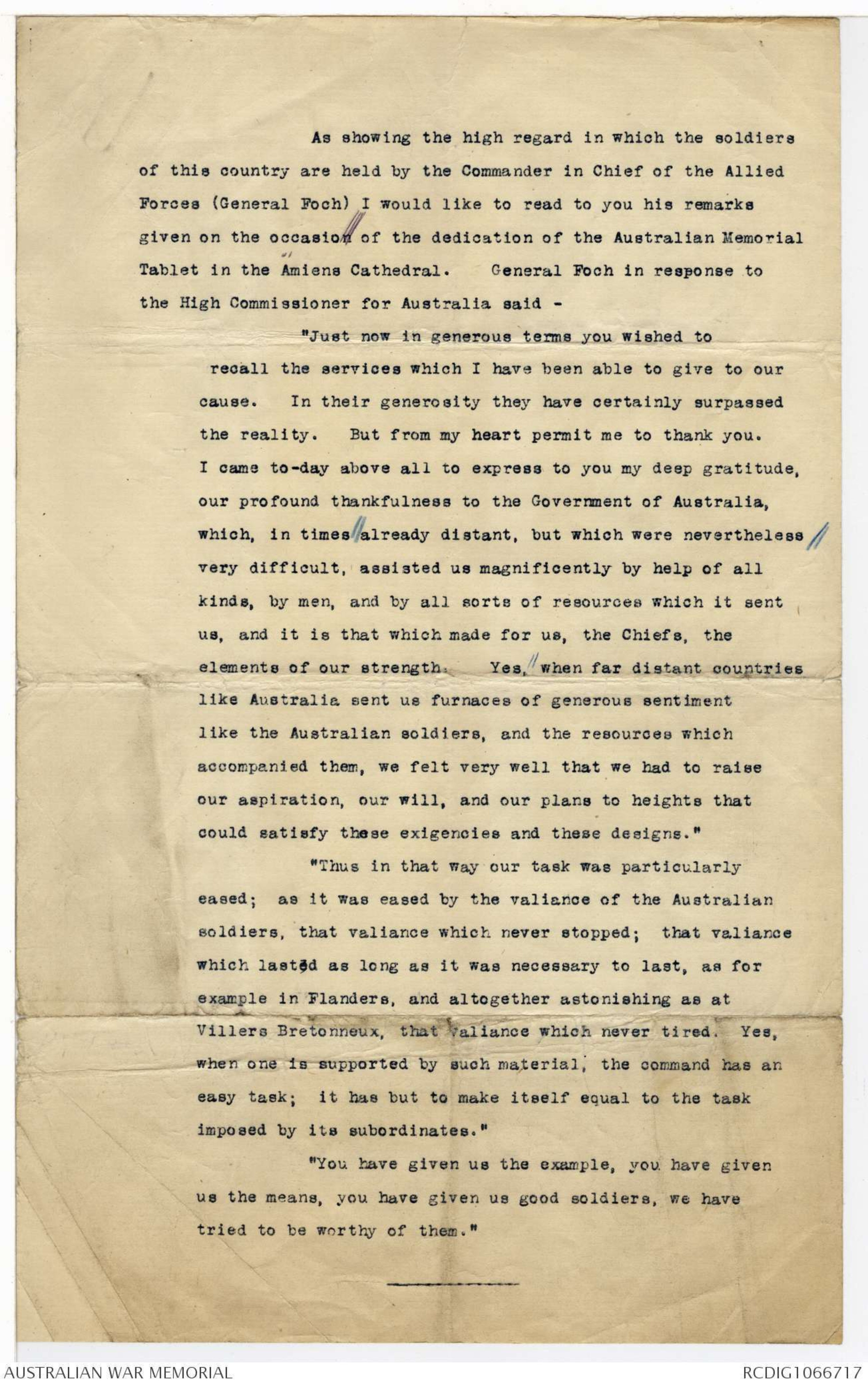
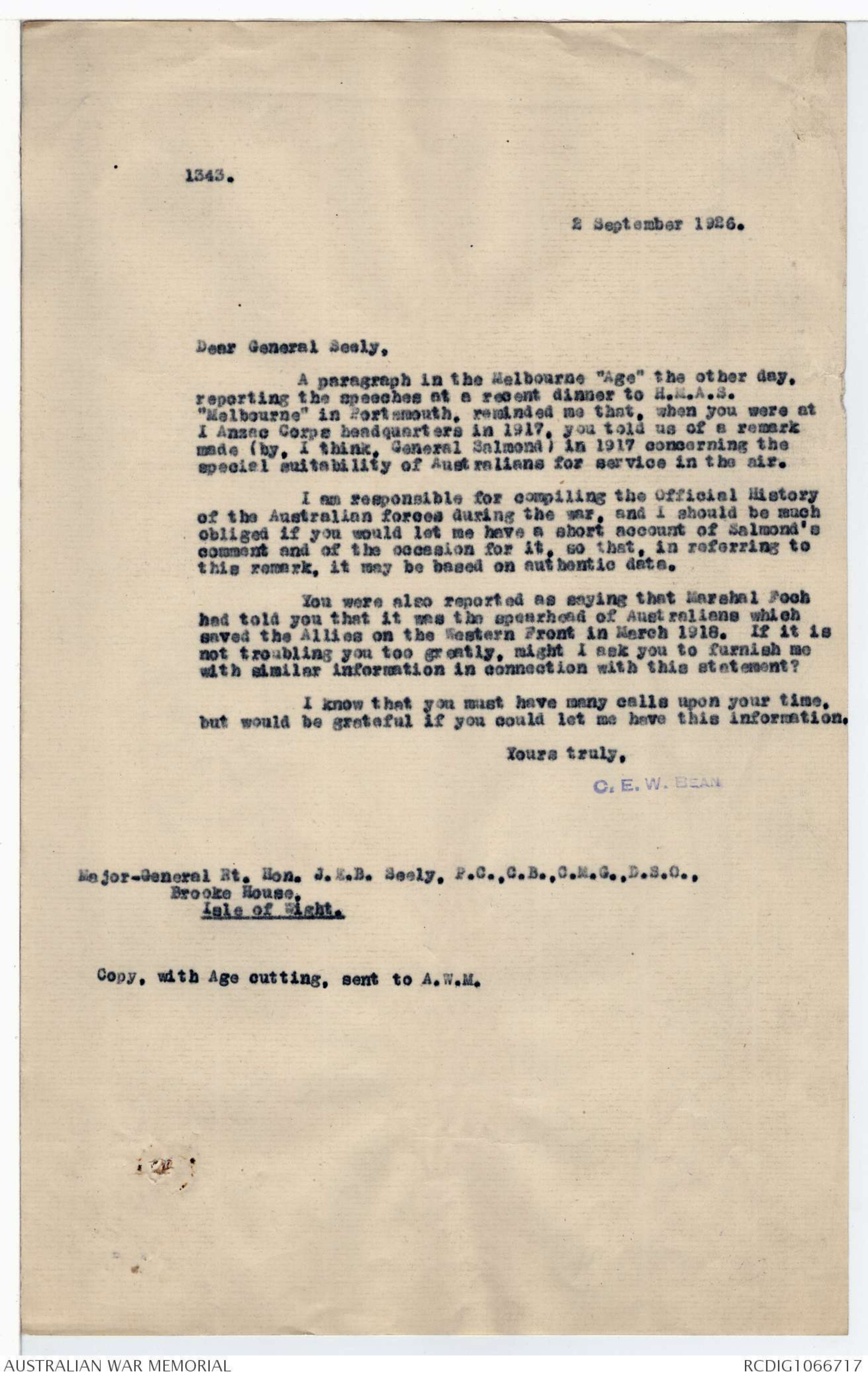
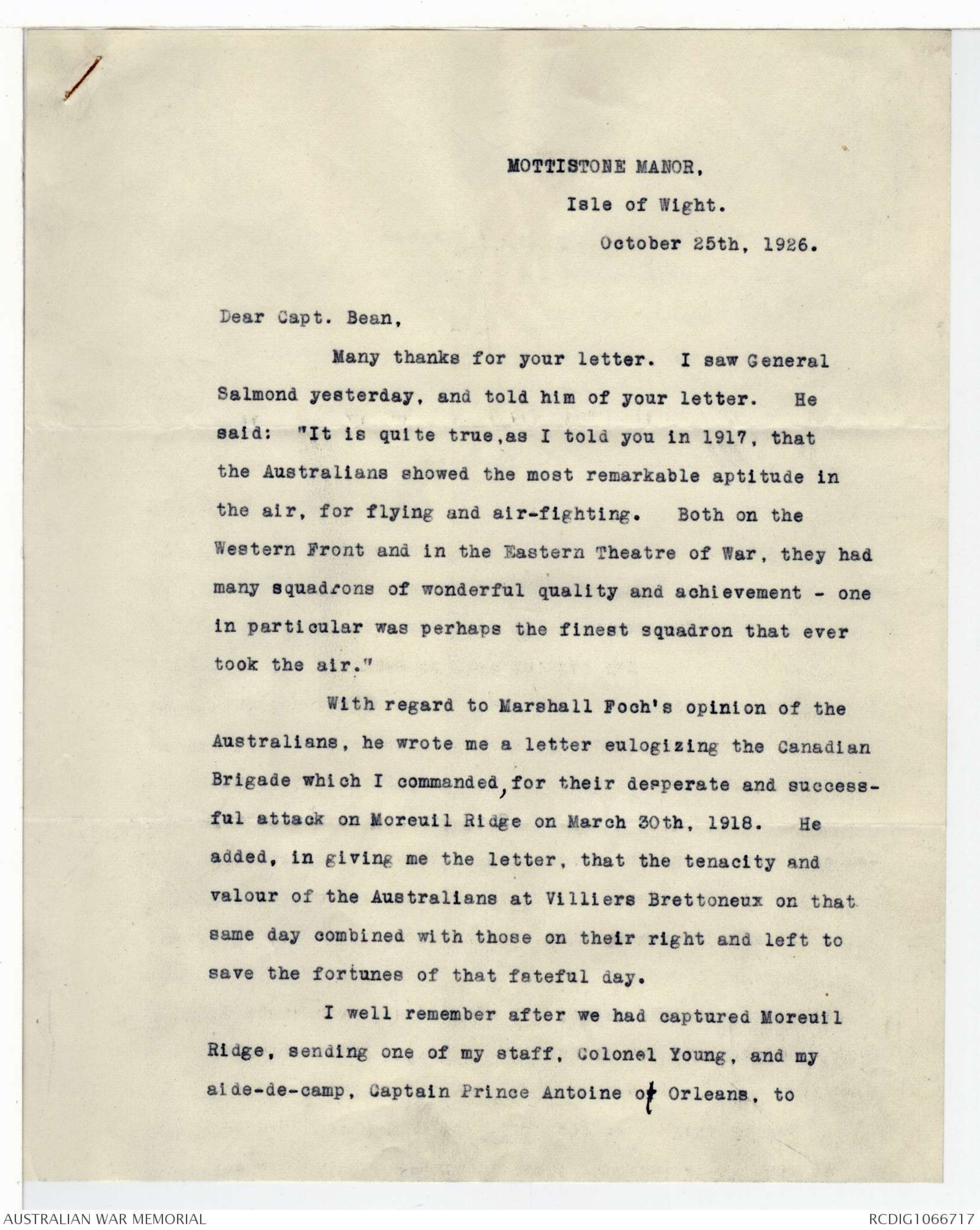
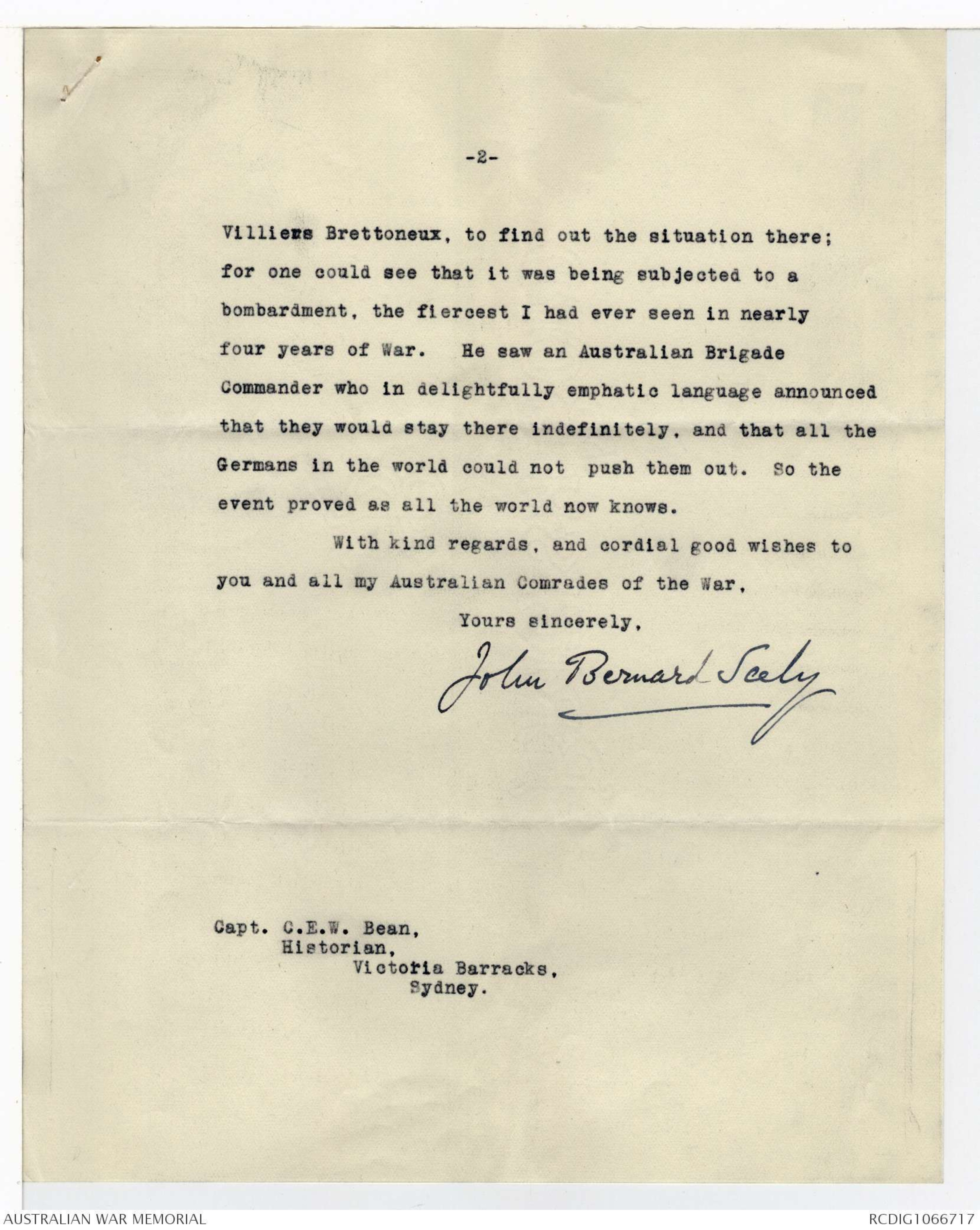
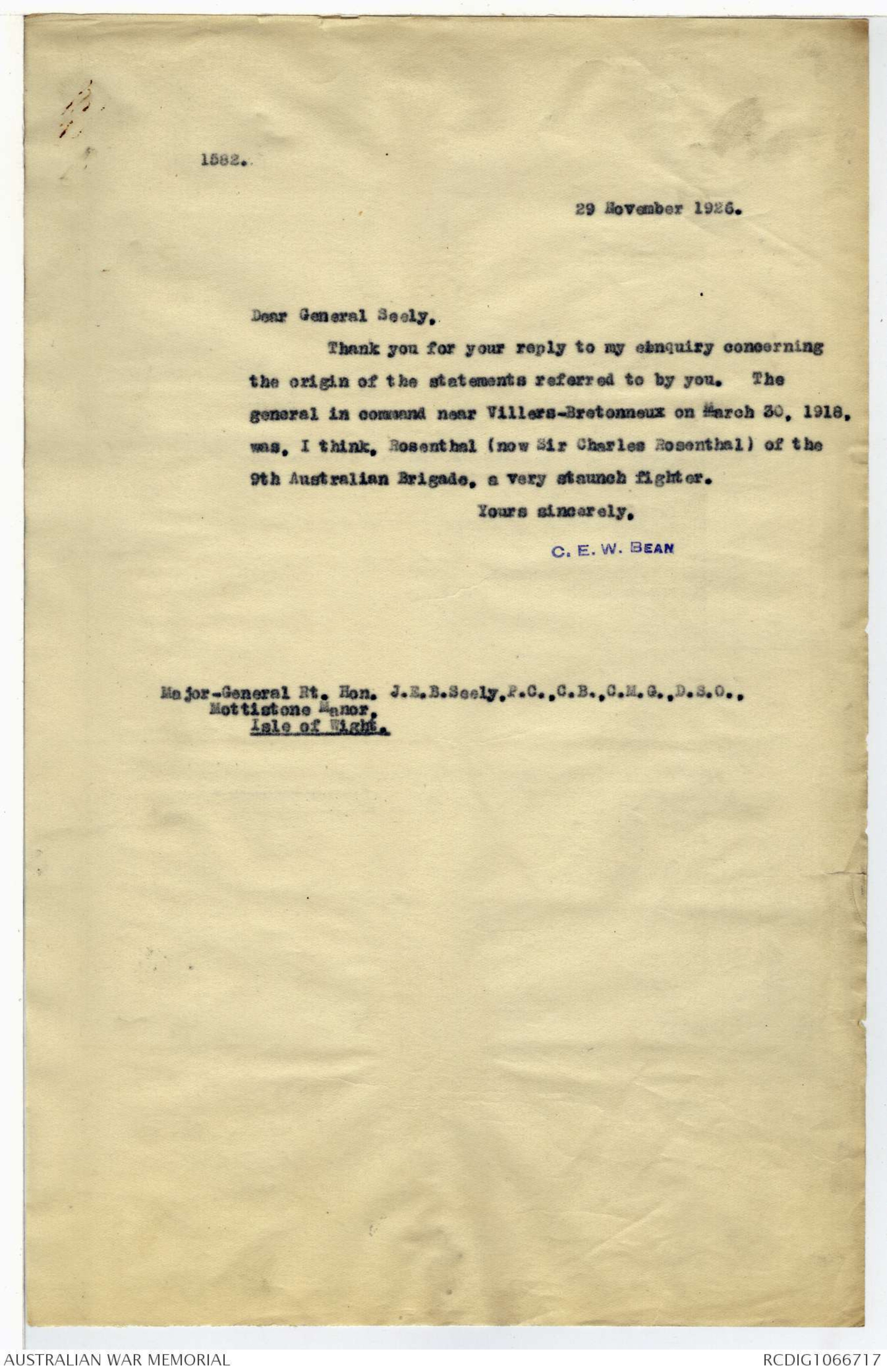
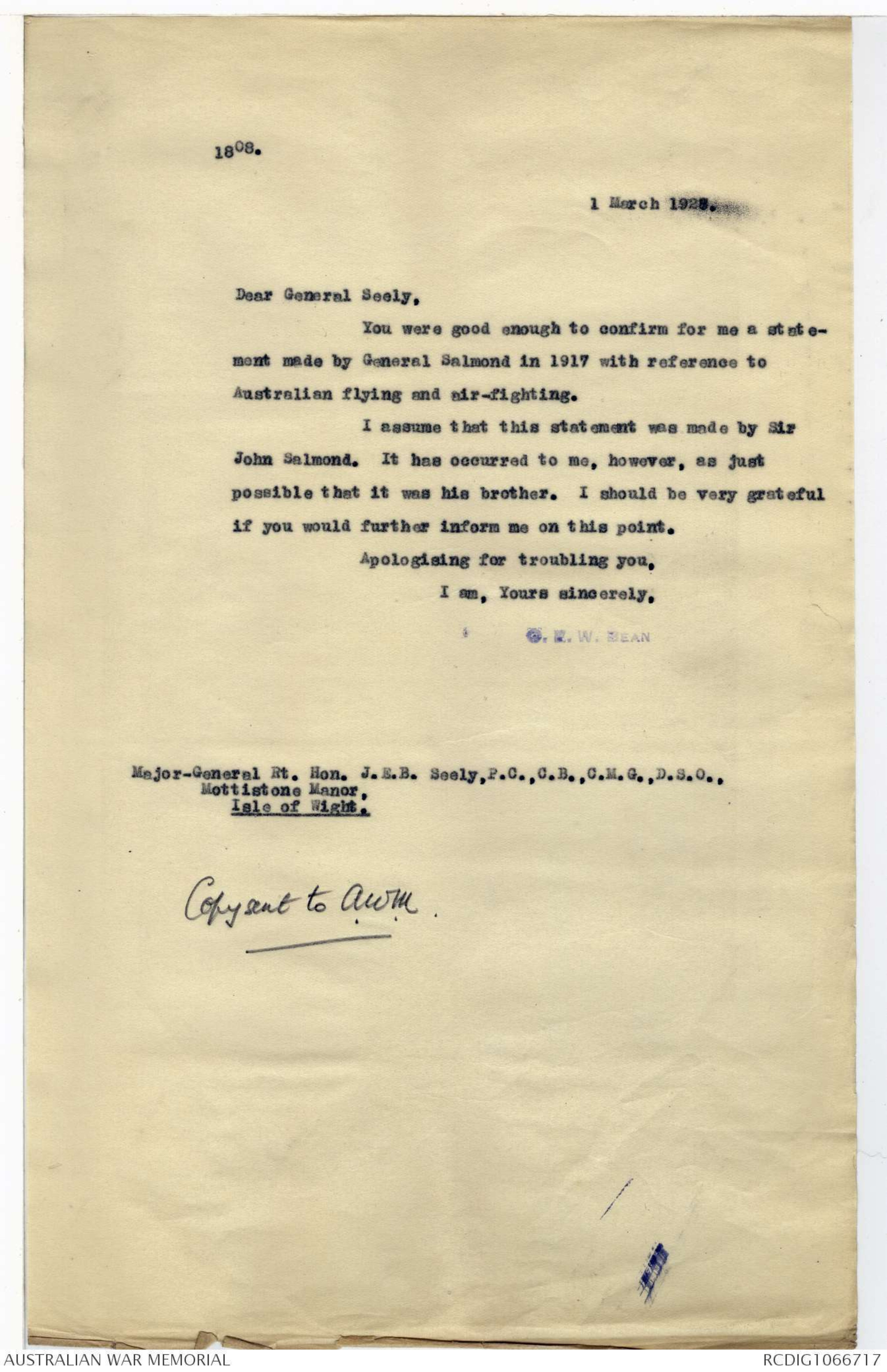
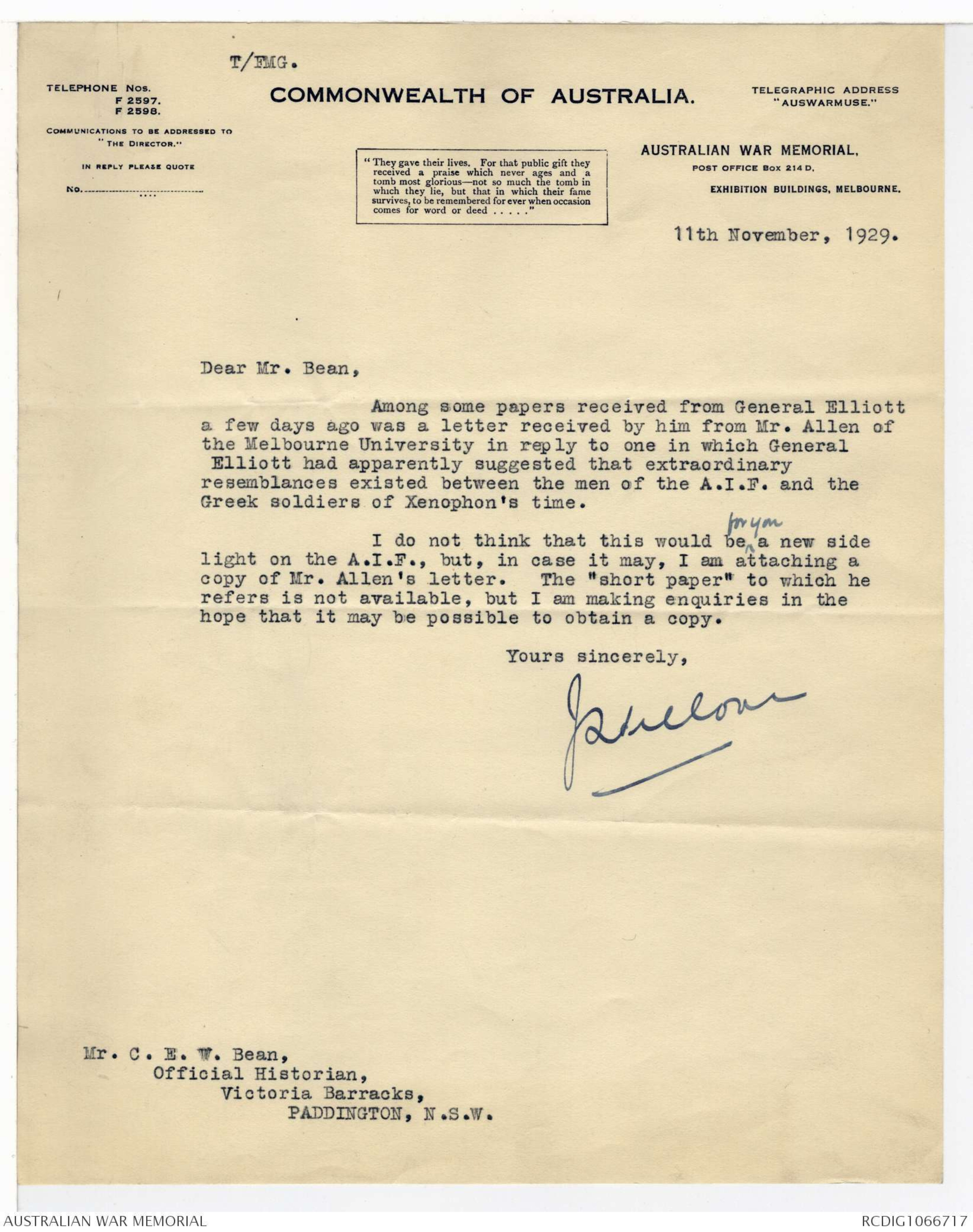
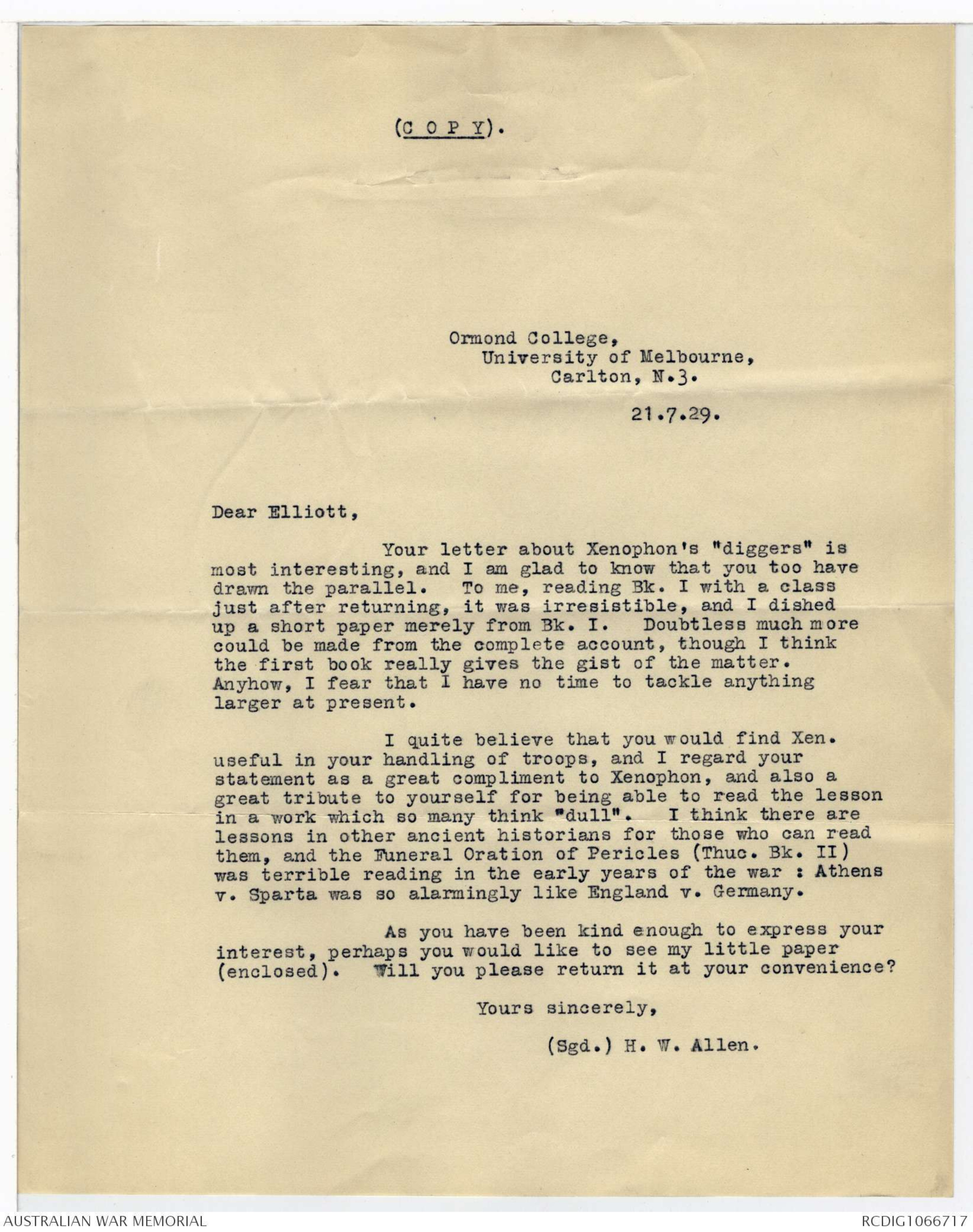
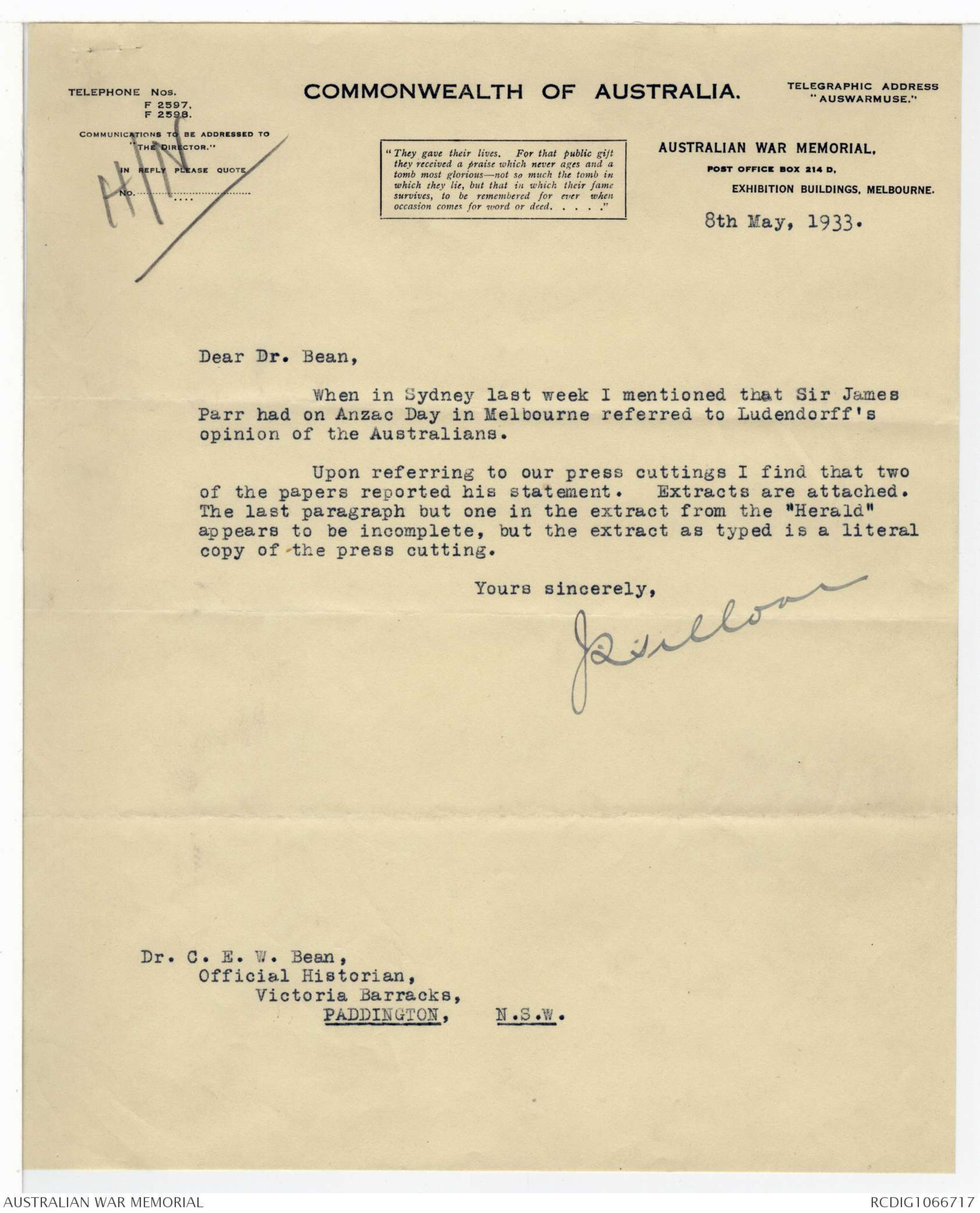
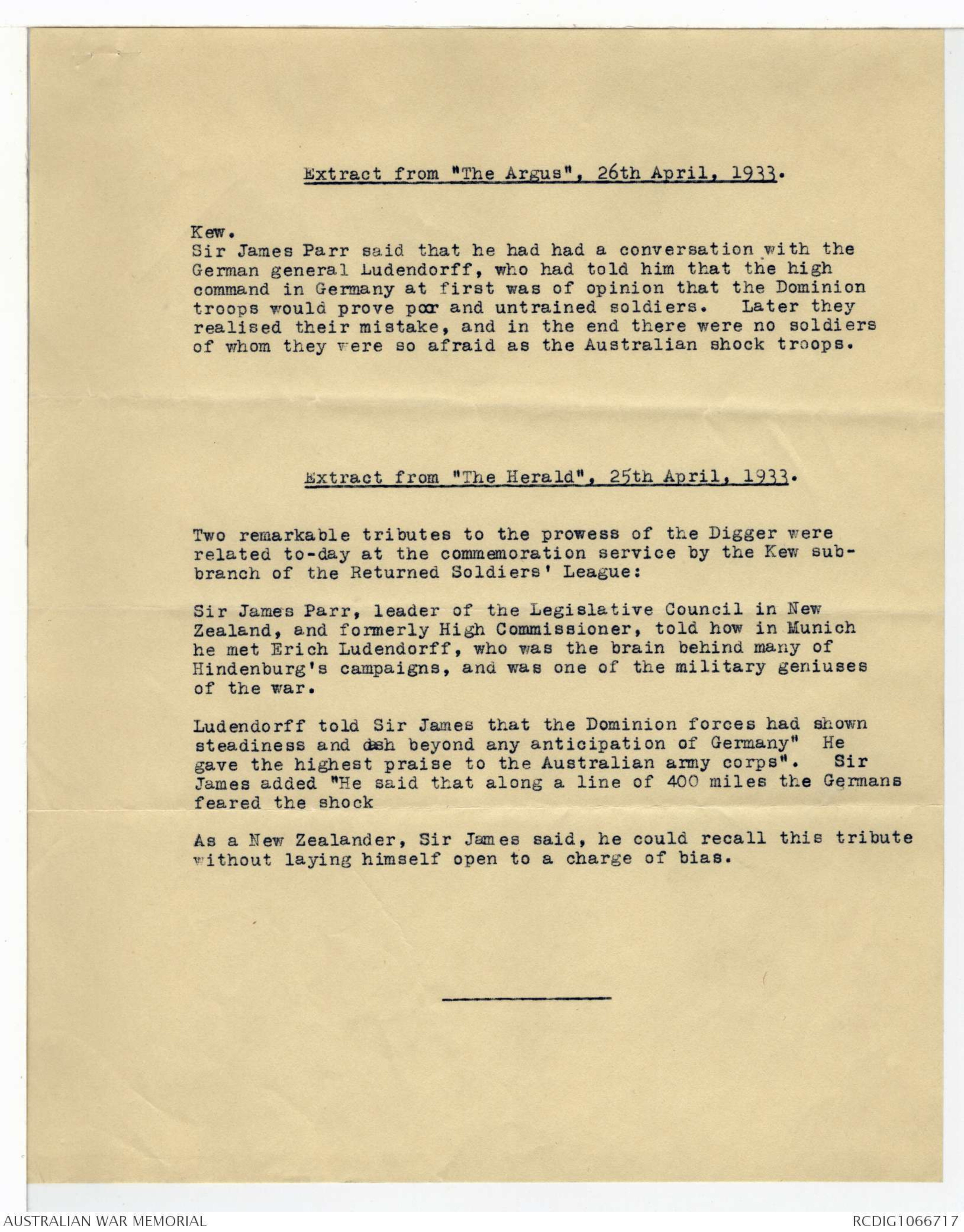
As showing the high regard in which the soldiers
of this country are held by the Commander in Chief of the Allied
Forces (General Foch) I would like to read to you his remarks
given on the occasion of the dedication of the Australian Memorial
Tablet in the Amiens Cathedral. General Foch in response to
the High Commissioner for Australia said -
"Just now in generous terms you wished to
recall the services which I have been able to give to our
cause. In their generosity they have certainly surpassed
the reality. But from my heart permit me to thank you.
I came to-day above all to express to you my deep gratitude,
our profound thankfulness to the Government of Australia,
which, in times already distant, but which were nevertheless
very difficult, assisted us magnificently by help of all
kinds, by men, and by all sorts of resources which it sent
us, and it is that which made for us, the Chiefs, the
elements of our strength. Yes, when far distant countries
like Australia sent us furnaces of generous sentiment
like the Australian soldiers, and the resources which
accompanied them, we felt very well that we had to raise
our aspiration, our will, and our plans to heights that
could satisfy these exigencies and these designs."
"Thus in that way our task was particularly
eased; as it was eased by the valiance of the Australian
soldiers, that valiance which never stopped; that valiance
which lasted as long as it was necessary to last, as for
example in Flanders, and altogether astonishing as at
Villers Bretonneux, that valiance which never tired. Yes,
when one is supported by such material, the command has an
easy task; it has but to make itself equal to the task
imposed by its subordinates."
"You have given us the example, you have given
us the means, you have given us good soldiers, we have
tried to be worthy of them."
1343.
2 September 1926.
Dear General Seely,
A paragraph in the Melbourne "Age" the other day,
reporting the speeches at a recent dinner to H.M.A.S.
"Melbourne" in Portsmouth, reminded me that, when you were at
I Anzac Corps headquarters in 1917, you told us of a remark
made (by, I think, General Salmond) in 1917 concerning the
special suitability of Australians for service in the air.
I am responsible for compiling the Official History
of the Australian forces during the war, and I should be much
obliged if you would let me have a short account of Salmond's
comment and of the occasion for it, so that, in referring to
this remark, it may be based on authentic date.
You were also reported as saying that Marshal Foch
had told you that it was the spearhead of Australians which
saved the Allies on the Western Front in March 1918. If it is
not troubling you too greatly, might I ask you to furnish me
with similar information in connection with this statement?
I know that you must have many calls upon your time,
but would be grateful if you could let me have this information.
Yours truly,
C. E. W. BEAN
Major-General Rt. Hon. J.E.B. Seely, P.C., C.B., C.M.G., D.S.O.,
Brooke House,
Isle of Wight.
Copy, with Age cutting, sent to A.W.M.
MOTTISTONE MANOR,
Isle of Wight.
October 25th, 1926.
Dear Capt. Bean,
Many thanks for your letter. I saw General
Salmond yesterday, and told him of your letter. He
said: "It is quite true, as I told you in 1917, that
the Australians showed the most remarkable aptitude in
the air, for flying and air-fighting. Both on the
Western Front and in the Eastern Theatre of War, they had
many squadrons of wonderful quality and achievement - one
in particular was perhaps the finest squadron that ever
took the air."
With regard to Marshall Foch's opinion of the
Australians, he wrote me a letter eulogizing the Canadian
Brigade which I commanded, for their desperate and successful
attack on Moreuil Ridge on March 30th, 1918. He
added, in giving me the letter, that the tenacity and
valour of the Australians at Villiers Brettoneux on that
same day combined with those on their right and left to
save the fortunes of that fateful day.
I well remember after we had captured Moreuil
Ridge, sending one of my staff, Colonel Young, and my
aide-de-camp, Captain Prince Antoine or Orleans, to
-2-
Villiers Brettoneux, to find out the situation there;
for one could see that it was being subjected to a
bombardment, the fiercest I had ever seen in nearly
four years of War. He saw an Australian Brigade
Commander who in delightfully emphatic language announced
that they would stay there indefinitely, and that all the
Germans in the world could not push them out. So the
event proved as all the world now knows.
With kind regards, and cordial good wishes to
you and all my Australian Comrades of the War,
Yours sincerely,
John Bernard Seely
Capt. C.E.W. Bean,
Historian,
Victoria Barracks,
Sydney.
1582.
29 November 1926.
Dear General Seely,
Thank you for your reply to my einquiry concerning
the origin of the statements referred to by you. The
general in command near Villers-Bretonneux on March 30, 1918,
was, I think, Rosenthal (now Sir Charles Rosenthal) of the
9th Australian Brigade, a very staunch fighter.
Yours sincerely,
C. E. W. BEAN
Major-General Rt. Hon. J.E.B. Seely, P.C.,C.B.,C.M.G.,D.S.O.,
Mottistone Manor,
Isle of Wight.
1808.
1 March 1928.
Dear General Seely,
You were good enough to confirm for me a statement
made by General Salmond in 1917 with reference to
Australian flying and air-fighting.
I assume that this statement was made by Sir
John Salmond. It has occurred to me, however, as just
possible that it was his brother. I should be very grateful
if you would further inform me on this point.
Apologising for troubling you,
I am, Yours sincerely,
C. E. W. BEAN
Major-General Rt. Hon. J.E.B. Seely, P.C., C.B., C.M.G., D.S.O.,
Mottistone Manor,
Isle of Wight.
Copy sent to A.W.M.
T/FMG.
TELEPHONE NOS.
F 2597.
F 2598.
COMMUNICATIONS TO BE ADDRESSED TO
"THE DIRECTOR."
IN REPLY PLEASE QUOTE
NO.
TELEGRAPHIC ADDRESS
"AUSWARMUSE."
COMMONWEALTH OF AUSTRALIA.
AUSTRALIAN WAR MEMORIAL,
POST OFFICE BOX 214 D,
EXHIBITION BUILDINGS, MELBOURNE.
"They gave their lives. For that public gift they
received a praise which never ages and a
tomb most glorious—not so much the tomb in
which they lie, but that in which their fame
survives, to be remembered for ever when occasion
comes for word or deed . . . . ."
11th November, 1929.
Dear Mr. Bean,
Among some papers received from General Elliott
a few days ago was a letter received by him from Mr. Allen of
the Melbourne University in reply to one in which General
Elliott had apparently suggested that extraordinary
resemblances existed between the men of the A.I.F. and the
Greek soldiers of Xenophon's time.
I do not think that this would be ^for you a new side
light on the A.I.F., but, in case it may, I am attaching a
copy of Mr. Allen's letter. The "short paper" to which he
refers is not available, but I am making enquiries in the
hope that it may be possible to obtain a copy.
Yours sincerely,
[[J Treloar?]]
Mr. C. E. W. Bean,
Official Historian,
Victoria Barracks,
PADDINGTON, N.S.W.
(COPY).
Ormond College,
University of Melbourne,
Carlton, N.3.
21.7.29.
Dear Elliott,
Your letter about Xenophon's "diggers" is
most interesting, and I am glad to know that you too have
drawn the parallel. To me, reading Bk. I with a class
just after returning, it was irresistible, and I dished
up a short paper merely from Bk. I. Doubtless much more
could be made from the complete account, though I think
the first book really gives the gist of the matter.
Anyhow, I fear that I have no time to tackle anything
larger at present.
I quite believe that you would find Xen.
useful in your handling of troops, and I regard your
statement as a great compliment to Xenophon, and also a
great tribute to yourself for being able to read the lesson
in a work which so many think "dull". I think there are
lessons in other ancient historians for those who can read
them, and the Funeral Oration of Pericles (Thuc. Bk. II)
was terrible reading in the early years of the war : Athens
v. Sparta was so alarmingly like England v. Germany.
As you have been kind enough to express your
interest, perhaps you would like to see my little paper
(enclosed). Will you please return it at your convenience?
Yours sincerely,
(Sgd.) H. W. Allen.
TELEPHONE NOS.
F 2597.
F 2598.COMMUNICATIONS TO BE ADDRESSED TO"THE DIRECTOR."IN REPLY PLEASE QUOTENO.
H/N
TELEGRAPHIC ADDRESS
"AUSWARMUSE."
COMMONWEALTH OF AUSTRALIA.
AUSTRALIAN WAR MEMORIAL,
POST OFFICE BOX 214 D,
EXHIBITION BUILDINGS, MELBOURNE.
"They gave their lives. For that public gift they
received a praise which never ages and a
tomb most glorious—not so much the tomb in
which they lie, but that in which their fame
survives, to be remembered for ever when occasion
comes for word or deed . . . . ."
8th May, 1933.
Dear Mr. Bean,
When in Sydney last week I mentioned that Sir James
Parr had on Anzac Day in Melbourne referred to Ludendorff's
opinion of the Australians.
Upon referring to our press cuttings I find that two
of the papers reported his statement. Extracts are attached.
The last paragraph but one in the extract from the "Herald"
appears to be incomplete, but the extract as typed is a literal
copy of the press cutting.
Yours sincerely,
J Treloar
Dr. C. E. W. Bean,
Official Historian,
Victoria Barracks,
PADDINGTON, N.S.W.
Extract from "The Argus", 26th April, 1933.
Kew.
Sir James Parr said that he had had a conversation with the
German general Ludendorff, who had told him that the high
command in Germany at first was of opinion that the Dominion
troops would prove poor and untrained soldiers. Later they
realised their mistake, and in the end there were no soldiers
of whom they were so afraid as the Australian shock troops.
Extract from "The Herald", 25th April, 1933.
Two remarkable tributes to the prowess of the Digger were
related to-day at the commemoration service by the Kew sub-
branch of the Returned Soldiers' League:
Sir James Parr, leader of the Legislative Council in New
Zealand, and formerly High Commissioner, told how in Munich
he met Erich Ludendorff, who was the brain behind many of
Hindenburg's campaigns, and was one of the military geniuses
of the war.
Ludendorff told Sir James that the Dominion forces had shown
steadiness and dash beyond any anticipation of Germany" He
gave the highest praise to the Australian army corps". Sir
James added "He said that along a line of 400 miles the Germans
feared the shock
As a New Zealander, Sir James said, he could recall this tribute
without laying himself open to a charge of bias.
----------------------------
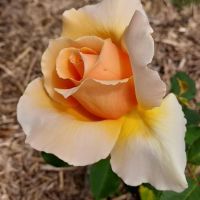 Maria Okon
Maria OkonThis transcription item is now locked to you for editing. To release the lock either Save your changes or Cancel.
This lock will be automatically released after 60 minutes of inactivity.